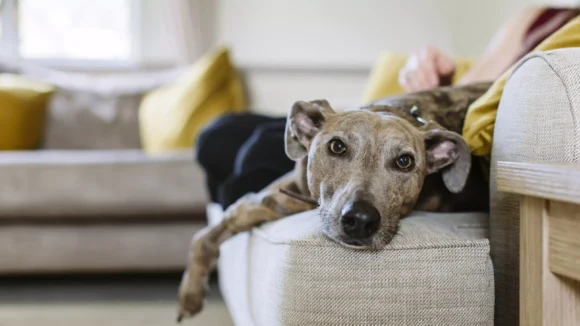BLOAT IN DOGS
Bloat is a medical emergency that causes a dog’s stomach to dangerously fill with air and sometimes twist.
Bloat is an extremely painful and dangerous condition for dogs. Any dog can become bloated, so it’s important to recognize the symptoms and understand how to prevent it.
Important: Bloat in dogs is life-threatening and can become fatal within hours with no treatment. If you think your dog has bloat, contact your vet immediately.
What is bloat in dogs?
Bloat, otherwise known as gastric dilation (GD) or gastric dilation volvulus (GDV), is one of the most life-threatening conditions that vets treat. Thankfully, bloat in dogs is rare.
If your dog becomes bloated, their stomach will fill with gas and can twist in a way that cuts off the blood supply to their gut. It can also cause their spleen to twist and lose circulation, which blocks vital veins that transport blood to your dog’s heart.
Bloat is very painful and it can kill in a matter of hours without veterinary treatment. Take your dog to your vet immediately if you think they are suffering from bloat.
What are the signs of bloat in dogs?
Signs of bloat can appear quickly, and will usually include one or more of the following:
A swollen, hard belly
Retching but not able to vomit
Drooling
Pain in the stomach when touched
Panting and restlessness
What should I do if I think my dog has bloat?
If you’re worried that your dog has bloat, take them to your vet immediately. A few minutes can make a difference to your dog’s chance of survival.
How will my vet treat bloat?
Your vet will assess your dog’s condition and decide if any further tests such a blood tests, X-rays or scans are required.
If bloat is confirmed, treatment will begin immediately. This can consist of:
passing a stomach tube to release the build up of gas and air in the stomach
giving intravenous fluids (fluids through a drip) to help your dog’s circulation and counteract the shock
giving painkillers and other medications surgery – if your dog is stable after their initial treatment, surgery is needed in some cases, particularly if the stomach has twisted. As there is a high risk that dogs with bloat could suffer again, your vet may also fix your dog’s stomach to their body wall so that it can’t twist again (this operation is known as a gastropexy).
Bloat is a very serious and dangerous condition and sadly not all dogs survive. Your vet may advise putting your dog to sleep if they consider them to be too unwell or if they are not responding to treatment.
What causes bloat in dogs?
The causes of bloat are not really understood, but there are things that are thought to contribute towards bloat, such as:
- eating meals too quickly
- eating meals that are too large
- exercising soon after a meal
- being overweight or very underweight
- certain breeds
- a family history of bloat
- age – older dogs are more at risk
- stress
Which dog breeds are more prone to developing bloat?
Any dog can suffer with bloat but larger breeds with deep chests are particularly susceptible. They include:
Great Danes
St Bernards
Weimaraners
German shepherds
Labradors
How do I prevent bloat in my dog?
There are some steps that you can take to help prevent bloat from developing.
Spread your dog’s meals across the day by feeding little and often, rather than one big meal each day
Avoid strenuous exercise straight after mealtime. Try to leave at least one hour between meals and exercise.
Give your dog their meals in a slow feeder, to stop them from eating their food too quickly
Keep your dog at a healthy weight



